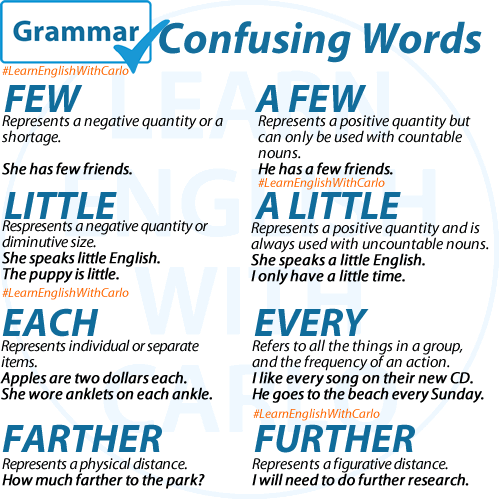GRAMMAR – Adjectives that quantify.
The words in this image can be adjectives, pronouns, or determiners.

- FEW vs. A FEW
Few is a quantifier used with plural countable nouns. Without the article “a,” few emphasizes a small number of something. Adding the article removes the emphasis—a few means some. - FEWER
Fewer is a comparative adjective. It is only used with countable nouns and means a smaller quantity (number). - LITTLE vs. A LITTLE
The same rule applies to little, which is used with singular uncountable nouns. Without the article “a,” little emphasizes a small quantity of something. Adding the article removes the emphasis—a little means some. - EACH vs. EVERY
Each and every are commonly confused.
Each is a way to emphasize the individual people or things in a pair or group. We can use each in affirmative sentences, negative sentences, and questions. Each can only be used with countable nouns. When it precedes a subject noun, the noun is singular and it takes a singular verb.
Every is a way to emphasize all the members of a group. We can use every in affirmative sentences, negative sentences, and questions. Every can only be used with count nouns. When it precedes a subject noun, the noun is singular, and it takes a singular verb. This is very confusing to students because the meaning is always plural (every always means more than one). - FARTHER
Farther is only used for distance. It’s a comparative adjective, so it’s used to compare the distance remaining to the distance already traveled, or when comparing the distances to different places from one point. - FURTHER
Further can be used for distance, but it is more commonly used in a figurative sense. It refers to going “beyond” in degree, time, or progress. It’s a comparative adjective, so it’s used to talk about continuing, extending, or adding to something, such as information, effort, or development.
